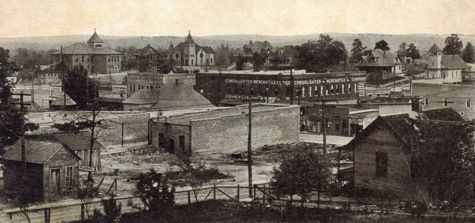Wylam
- This article is about the former mining camp and municipality. For the Birmingham neighborhood, see Wylam neighborhood.
Wylam is a former coal-mining community, later an incorporated town, and now a neighborhood of western Birmingham.
The then-unnamed community was established with the opening of the Tennessee Coal Iron and Railroad Company's Number One and Number Two mines in 1886. When they opened three more mines, the company began advertising for miners in Europe, attracting immigrants from Scotland, England, Wales, France, Italy, Greece, Russia, Germany, Poland and Yugoslavia.
One of these, Joseph Martin, a native of the coal-mining village of Wylam, Northumberland, left the mines to establish a store and homebuilding business. His store was used as the community's first post office and he gave the community the name of his home town. Many from his depressed home town learned of his success and followed him to Alabama. He also established the community's first Methodist church in 1888, now called Martin Memorial Methodist Church in his honor. The Wylam Baptist Church was founded in 1890 and Wylam Presbyterian Church in 1898 by the Scottish community.
The Brodie Hill neighborhood was established by John and Sam Brodie who immigrated from Ayrshire, Scotland via Pratt City and purchased land near the Number Four mine to build houses for themselves and their relatives.
A Polish immigrant, William Kuzmicki established a small vineyard and performed blacksmithing work after hours to help pay for violin lessons for his children. He also published a small newsletter, The American Echo, for new immigrants. His death in a collapse of Wylam Mine No. 5 left a large family, which found the community to be very caring.
Many of the miners in Wylam joined unions. William Brodie, a member of the Knights of Labor was killed in 1887 in a dispute with an official guarding convict miners leased to TCI. The United Mine Workers of Alabama organized Wylam miners in the 1890s under French immigrant Frank Fournier. Numerous strikes between 1894 and 1921 created tension between ethnic groups, especially against African Americans and Italians, who were perceived as having been brought in as strike-breakers. The Alabama National Guard entered Wylam to put down strikes in 1919 and 1921.
The Wylam Masonic Lodge was established in 1890. The community's soccer team, made up of Scottish immigrants, forged a rivalry with Pratt City's Irish dominated squad. The two teams often vied for the Ramsay Cup, a trophy created by Erskine Ramsay to honor the city's best soccer team.
The community voted to incorporate in 1900 with Martin as its first mayor. A streetcar link to downtown Birmingham was established in 1903 to supplement the TCI Railway Number 450, which had carried people to town. The Wylam line connected to the main Pratt City line at Tuxedo Junction in Ensley. After 1900 the creation of the Ensley Furnace, and later the Fairfield Works provided new sources of work for Wylam residents. A large fire on April 15, 1904 destroyed 18 houses, including those of Mayor W. J. Stacy and physician W. D. Caldwell. The town's volunteer fire department was assisted by a fire company from Ensley, but a lack of water undercut their efforts.
The town was annexed into Birmingham as part of the "Greater Birmingham" expansion on January 1, 1910.
Additional waves of Slavs and Poles came into the community in the early 20th century, establishing the St Stanislaus Parish in 1913 and building the St Stanislaus Catholic Church in 1923. Businesses like Consolidated Mercantile and Morris Levy's jewelry store opened in the 1920s. The town's population reached 5,000 in those years.
On January 11, 1930 the Wylam branch of the Bank of Ensley failed, bankrupting numerous families in the area. Dave Moxley's blackface minstrel troupe helped raise money for relief of Wylam's struggling families. U. S. Steel opened a new Tin Mill in Fairfield in 1935, providing new jobs.
The availability of cars and mortgage loans made newer suburbs more attractive to the post-World War II generation, leaving Wylam, tucked in between industrial plants, to decline under the custodianship of aging residents. TCI's Ensley Works closed in 1971, removing the nearest big employer and accelerating that decline.
In the 21st century Wylam has become the home of the 6,000-member Faith Chapel Christian Center. U. S. Steel donated land for Wylam Oaks, a residential subdivision developed by Habitat for Humanity of Greater Birmingham beginning in 2007.
Notable residents
- W. D. Caldwell, physician
- Jim Carlin, baseball fielder
- Morris Levy, jeweler
- Joseph Martin, merchant and 1st Mayor of Wylam
- William John Stacey, merchant and 2nd Mayor of Wylam
References
- Birmingfind (1981) "The best people in the world live in WYLAM". Birmingham: Birmingfind
- Fullman, Lynn Grisard (c. 1982) "Wylam..." The Birmingham News
